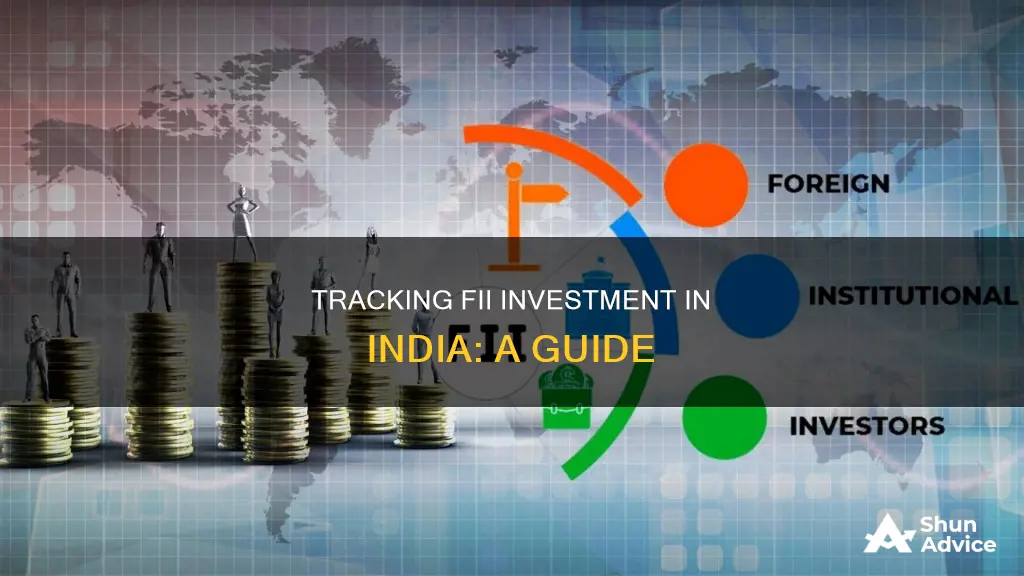
Foreign Institutional Investors (FIIs) are companies that invest in other companies in countries outside of their own. FIIs can be a single individual or a fund, such as a pension fund, mutual fund, insurance fund, or hedge fund. In India, FIIs must be registered with the Securities and Exchange Board of India (SEBI) to participate in the financial markets. FIIs have a significant impact on the Indian stock market as they invest large sums of money, and their buying and selling decisions can influence stock prices and market sentiment. As such, tracking FII investment trends is important for investors looking to make informed decisions about their own portfolios. Websites such as the National Stock Exchange, the Bombay Stock Exchange, and Moneycontrol provide data on FII activities, including their trading activity and the stocks they are buying and selling. Additionally, tools like Equitymaster's Indian stock screener allow investors to track the latest FII trends and identify stocks that are attracting FII investment.
What You'll Learn

FII/FPI & DII trading activity on NSE, BSE and MSEI
The data is provisional, based on trading codes entered by members and client category classifications. It is subject to change due to the custodial confirmation process and modifications. For final FII data, users are directed to the NSDL website. The BSE data is compiled based on the marking of 'client type' during order execution on BOLT-TWs in the equity segment.
NSE India's website provides quick links for investors, including a dashboard for end-of-day reports, market snapshots, and important announcements. It also offers customisable reports for download and an RSS feed subscription for quick access to the latest information.
Overall, the NSE, BSE, and MSEI platforms provide valuable resources for tracking FII/FPI and DII trading activity, offering insights into the Indian capital market segment.
A Secure Guide to Investing in Indian Government Securities
You may want to see also

FII trends and tracking their investments
Foreign institutional investors (FIIs) are investors in a country who are from another country. In other words, they are registered investors of the foreign country. FIIs can be a single individual or usually a fund. In the case of a fund, they can take the form of long-only funds or hedge funds (which can go short on the market too). They can be pension funds, mutual funds, insurance funds, private portfolio investment funds, hedge funds, private equity funds, venture capital funds, investment banks, etc.
FIIs must be registered with the Securities and Exchange Board of India (SEBI) to participate in the Indian financial markets. They also have to be registered with India's portfolio investment scheme (PIS), which is highly regulated by the Reserve Bank of India (RBI). One of the important regulations is that an FII cannot invest more than 24% of the paid-up capital of an Indian company. If they wish to invest more, they require approval and a special resolution from the company's board.
FIIs typically look to invest in developing economies with high growth prospects, which is why India is an attractive investment destination for them. India is one of the fastest-growing countries in the world, with a stable and resilient economy that is poised for strong growth. The country's average growth rate over the past three decades has been relatively high, even after disruptions such as demonetisation and GST implementation.
FIIs invest in Indian companies by buying stocks of companies from the stock exchanges, such as the Bombay Stock Exchange (BSE) and the National Stock Exchange (NSE). They have various criteria for buying and selling stocks, as well as different holding periods. This results in FIIs holding a vast collection of stocks across sectors, themes, and market caps. Their favourites are large, stable companies with good management. Most companies in the benchmark indices Sensex and Nifty will qualify. They also invest in high-quality, fast-growing mid-caps and, to a lesser extent, small-caps.
Since FIIs invest huge sums of money in the Indian stock markets, their buy and sell calls have a major impact. When FIIs are net buyers—which means that they have collectively invested more than they have redeemed—the stock markets do well. And vice versa. As retail participation in India is low, a bulk of the stocks are bought by FIIs. Hence, if FIIs invest more, the stock markets treat that as positive news. This is why FII holding is an important metric to evaluate a company or sector.
To track FII trends and investments in India, investors can refer to the following resources:
- The websites of the National Stock Exchange and the Bombay Stock Exchange carry data on FII activities on their respective bourses. This data is available for public consumption and is updated daily.
- Equitymaster's Indian stock screener tracks the stocks recently bought and sold by FIIs in India.
- Tickertape screener can be used to filter stocks based on FII activities.
Reviving Nature: Planting vs. Preservation, Where Should We Invest?
You may want to see also

FII buying and selling activity
Foreign Institutional Investors (FIIs) are companies that invest in other companies in countries outside of their own. FIIs can be hedge funds, mutual funds, insurance companies, banks, corporates, or pension funds. Foreign companies must be registered with India's Portfolio Investment Scheme (PIS) to buy and sell stocks of Indian companies. This scheme is highly regulated by the RBI, which enforces regulations such as limiting FII investment to no more than 24% of the paid-up capital of an Indian company.
FIIs typically invest in developing economies with high growth prospects, such as India, which is one of the fastest-growing countries in the world. They do so by buying stocks of companies from the Indian stock exchanges, BSE and NSE, usually in huge amounts.
FIIs have a significant impact on the Indian stock market. When FIIs are net buyers, meaning they have invested more than they have redeemed, the stock markets perform well. As Indian companies require capital to run and expand, and due to low retail participation in India, a large portion of stocks is bought by FIIs. Therefore, increased FII investment is considered positive for the markets.
FIIs carry out extensive due diligence before investing and have access to substantial financial resources and talent. However, their investment strategies may differ from those of individual investors, and they are known for jumping in and out of investments very quickly. Thus, their trading activity may not always align with long-term investment goals.
To track FII buying and selling activity in India, investors can refer to the following resources:
- The websites of the National Stock Exchange and the Bombay Stock Exchange carry data on FII activities on their respective bourses, updated daily.
- Equitymaster's Indian stock screener tracks the stocks recently bought and sold by FIIs in India.
- Moneycontrol provides FII & DII trading activity data, including net purchases and sales.
The All-Weather Portfolio: A Guide to Investing for Stability
You may want to see also

FII activity and the Market Mood Index
Foreign institutional investors (FIIs) are companies that invest in other companies and are registered outside of India but invest in the Indian stock market. FIIs can be hedge funds, mutual funds, insurance companies, banks, corporates, or pension funds. FIIs are attracted to India because of its high growth prospects as a developing economy. India is one of the fastest-growing countries in the world, with a stable and resilient economy, and is expected to become the world's third-largest consumer market by 2030.
FIIs affect the Indian share markets and stock prices by investing large sums of money. When FIIs are net buyers, the stock markets perform well. FIIs carry out extensive due diligence before investing, so the companies they invest in can be considered sound investments. The Market Mood Index (MMI) is a tool that describes the current mood in the market as emotions. It takes into account the net open interest of FIIs in Index Futures on the NSE, with a higher-than-average value suggesting bullish FII views about the markets. The MMI also considers six other factors to give a complete picture of the emotions driving the market. These include volatility, skew, uptrend/downtrend, market strength, price strength, and the relative price return of gold vs Nifty 50 for the last two weeks.
The MMI is used to time trades and investments better. It indicates whether the market is in an extreme fear zone or an extreme greed zone. When the MMI is in the extreme fear zone (30), it suggests a good time to open fresh positions as the markets are likely to be oversold and might turn upwards. Conversely, when the MMI is in the extreme greed zone (70), it suggests investors should avoid opening new positions as the markets are overbought and likely to turn downwards.
The websites of the National Stock Exchange and the Bombay Stock Exchange provide daily data on FII activities, which can be used to filter stocks based on FII activity.
Monthly Savings: Invest Wisely, Grow Your Wealth
You may want to see also

FII vs FDI
Foreign Direct Investment (FDI) and Foreign Institutional Investor (FII) are two important types of investments that play a significant role in shaping the global investment landscape. While FDI involves long-term investments in physical assets and establishing business operations in a foreign country, FII focuses on short-term investments in the financial markets of a different country.
FDI is made by a company or individual seeking to establish a business presence, acquire assets, or expand their operations in a foreign market. It often involves significant control and ownership stakes in local businesses and has a direct impact on the host country's economy, including job creation, technology transfer, and economic development. FDI is subject to regulations related to foreign ownership, investment approvals, and compliance with local laws.
On the other hand, FII refers to investments made by institutional investors, such as investment funds, pension funds, and asset management companies, in the financial markets of a foreign country. FIIs typically invest in securities like stocks, bonds, derivatives, and other financial instruments. These investments bring liquidity and investment opportunities to the host country's financial markets. FIIs are governed by financial market regulations, including limits on foreign ownership and reporting requirements.
One of the key differences between FDI and FII is the nature of the investment. FDI involves long-term commitments, spanning several years or decades, as it involves establishing a physical presence and infrastructure in the foreign country. In contrast, FII investments are typically short-term, providing investors with the flexibility to enter or exit the market relatively quickly based on market conditions.
Another distinction lies in their focus. FDI focuses on investing in physical assets, such as factories, buildings, and infrastructure, to support their business operations. On the other hand, FII concentrates on financial instruments and portfolio diversification to generate financial returns.
FDI aims for market expansion, establishing a long-term presence in foreign markets, and accessing resources and capabilities to expand business operations. Meanwhile, FII's primary objective is earning financial returns and capitalizing on investment opportunities in high-growth economies like India and China.
In summary, FDI and FII have distinct roles in the global investment landscape. FDI contributes to economic development and job creation, while FII enhances market liquidity and provides investment capital. Understanding these differences is crucial for investors and policymakers to leverage the benefits of each investment type and promote economic growth.
Savings and Investments: Strategies for Effective Money Allocation
You may want to see also
Frequently asked questions
FII stands for Foreign Institutional Investor. A Foreign Institutional Investor is a company that is registered outside of India but invests in the Indian stock markets.
The websites of the National Stock Exchange and the Bombay Stock Exchange carry data on FII activities on their respective bourses. This data is available to the public and is updated daily.
Retail investors are individual investors. They trade to make money from the stock markets or invest for their personal and family goals and aspirations. FIIs, on the other hand, invest solely to make money and can have a short-term view of certain companies that they invest in. FIIs also usually have a larger investment volume than retail investors.
Equitymaster's Indian stock screener is a tool that tracks the stocks recently bought and sold by FIIs in India. Similarly, Tickertape screener can be used to filter stocks based on FII activities.
FDI stands for Foreign Direct Investment. While FIIs buy stocks of listed companies, FDI is an investment in an Indian company by its foreign parent.







